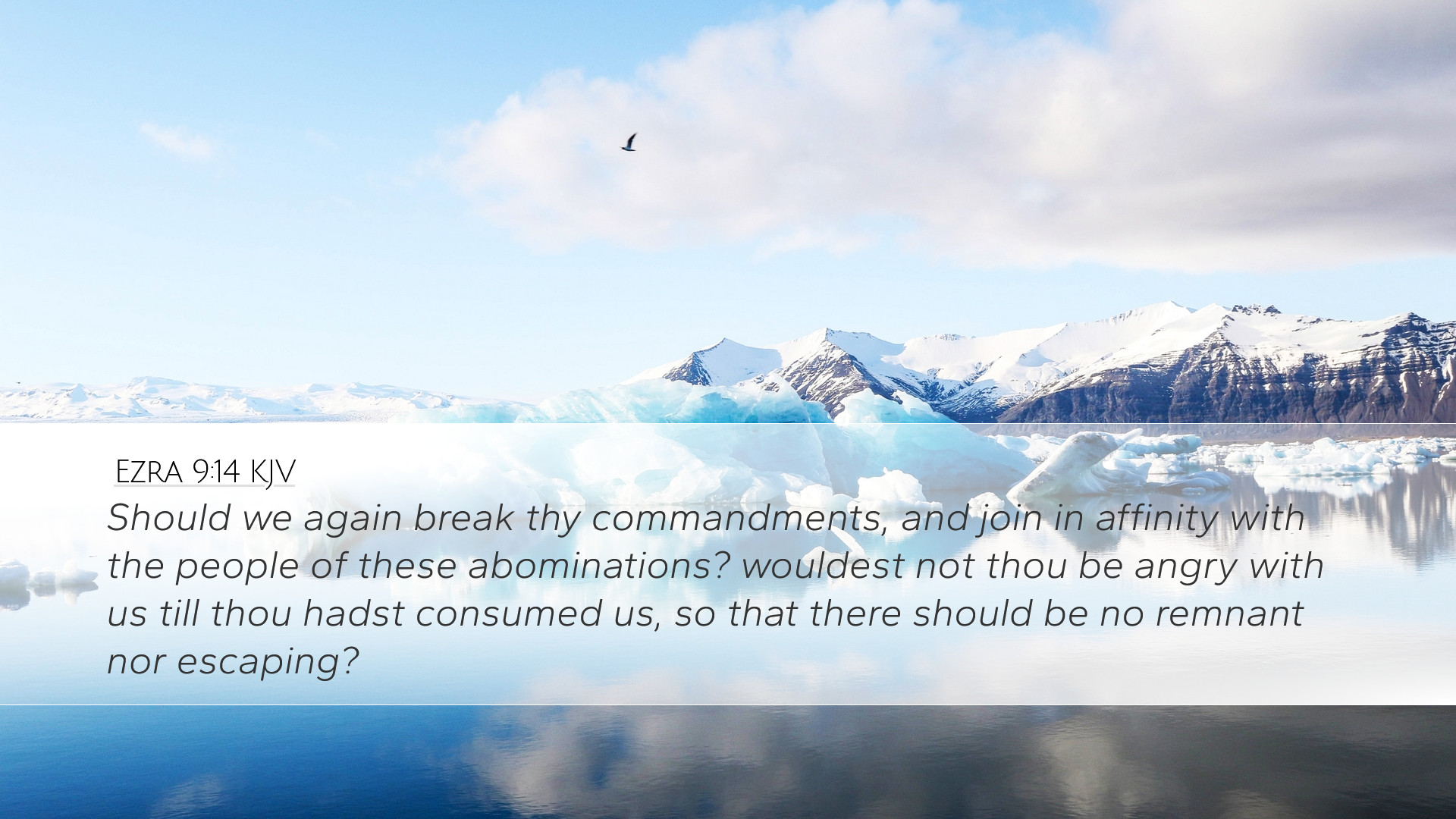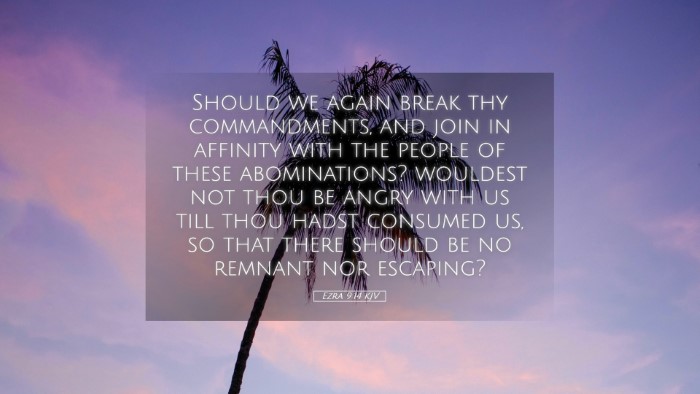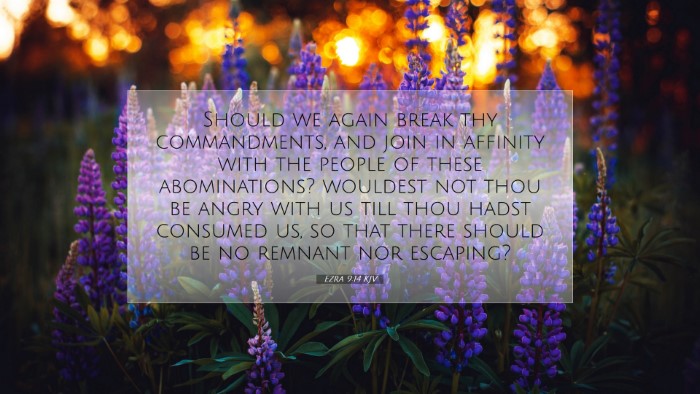Old Testament
Genesis Exodus Leviticus Numbers Deuteronomy Joshua Judges Ruth 1 Samuel 2 Samuel 1 Kings 2 Kings 1 Chronicles 2 Chronicles Ezra Nehemiah Esther Job Psalms Proverbs Ecclesiastes Song of Solomon Isaiah Jeremiah Lamentations Ezekiel Daniel Hosea Joel Amos Obadiah Jonah Micah Nahum Habakkuk Zephaniah Haggai Zechariah MalachiEzra 9:14
Ezra 9:14 KJV
Should we again break thy commandments, and join in affinity with the people of these abominations? wouldest not thou be angry with us till thou hadst consumed us, so that there should be no remnant nor escaping?
Ezra 9:14 Bible Commentary
Bible Commentary on Ezra 9:14
Verse Context: Ezra 9:14 states, “Should we again break thy commandments, and join in affinity with the people of these abominations? wouldest not thou be angry with us till thou hadst consumed us, so that there should be no remnant nor escaping?” This verse emerges in a poignant context, as Ezra reflects on the state of the people of Israel after the return from Babylonian captivity, confronted with the reality of their sins and the danger of societal integration with pagan practices.
Commentary Insights
1. The Seriousness of Sin
Ezra's rhetorical question expresses deep concern about the implications of returning to sin. Matthew Henry emphasizes that the sin of mixing with foreign nations was not merely a cultural issue but a spiritual one that could provoke God’s wrath. The call for moral and spiritual purity is echoed throughout the scriptures (2 Corinthians 6:14). The mention of "abominations" signifies the detestable practices those nations engaged in, further highlighting the need for a distinct identity among God’s people.
2. The Reality of Divine Anger
Albert Barnes notes that Ezra understands the gravity of their situation. The phrase "wouldest not thou be angry with us" underscores a common biblical theme of divine retribution where Israel's unfaithfulness results in judgment. The corporate nature of sin is highlighted; the actions of individuals can lead to consequences for the community. The metaphor of being "consumed" implies total destruction, illustrating the inevitability of God's judgment if the people continued down the path of disobedience.
3. The Plea for Righteousness
Ezra’s reflection is both a plea and a warning to his fellow Israelites. Adam Clarke points out that Ezra's leadership is characterized by a deep sense of responsibility for the spiritual state of the nation. He embodies the role of an intercessor, urging his peers to recognize the potential for catastrophic consequences resulting from their actions. Clarke suggests that this plea for righteousness is not merely academic but a desperate cry for a return to God’s covenant and holiness.
4. The Implications for Community
Ezra 9:14 serves as a reminder for community leaders and churches today. Matthew Henry suggests that when leaders fail to guide their people towards holiness, the entire community suffers. This passage could challenge contemporary church practices that may incorporate elements contrary to the faith, highlighting the importance of theological integrity within the community.
5. The Nature of Affinity
“When it says ‘join in affinity,’ it speaks to the relational aspects of the community’s life. Albert Barnes posits that forming alliances or marriages with those outside of Israel represented not merely personal choices but acts that endangered the community's fidelity to God. This echoes the New Testament’s call to be in the world but not of it (John 17:15-16).
6. Consumed or Preserved: A Call to Remnant Theology
Ezra's foresight in questioning whether their actions would lead to complete destruction is critical for understanding God’s purpose. Adam Clarke reflects on this concept of a "remnant." The reality is that even in judgment, God's mercy prevails, providing a remnant for future restoration. This theological nuance is essential for pastors and theologians who must grapple with the dual themes of judgment and redemption within Scripture.
7. Application for Today
Modern readers and leaders can learn much about the need for discernment in our relationships and the cultural influences we allow into our lives. The call to holiness is timeless, and as Ezra reflects on past missteps, contemporary Christians are challenged to consider how their lives align with biblical standards. Is there an awareness of the force of cultural assimilation today that mimics what Ezra faced?
8. Concluding Reflections
In summary, Ezra 9:14 challenges us to contemplate the weight of our affiliations and the seriousness of sin. As ministers of the Gospel, it is crucial to shepherd our communities with care, fostering a culture that resists the allure of worldly influences. True spirituality requires a continual re-evaluation of our commitments and relationships in the light of God’s Word, recognizing that our collective identity hinges on fidelity to His commands.
Final Thoughts: The explorations from Henry, Barnes, and Clarke offer a cohesive understanding of how Ezra 9:14 serves as both a warning and a guide for faithful living. As we engage with this text, may we strive for a deeper commitment to God’s holiness and a clearer understanding of our covenantal identity.


